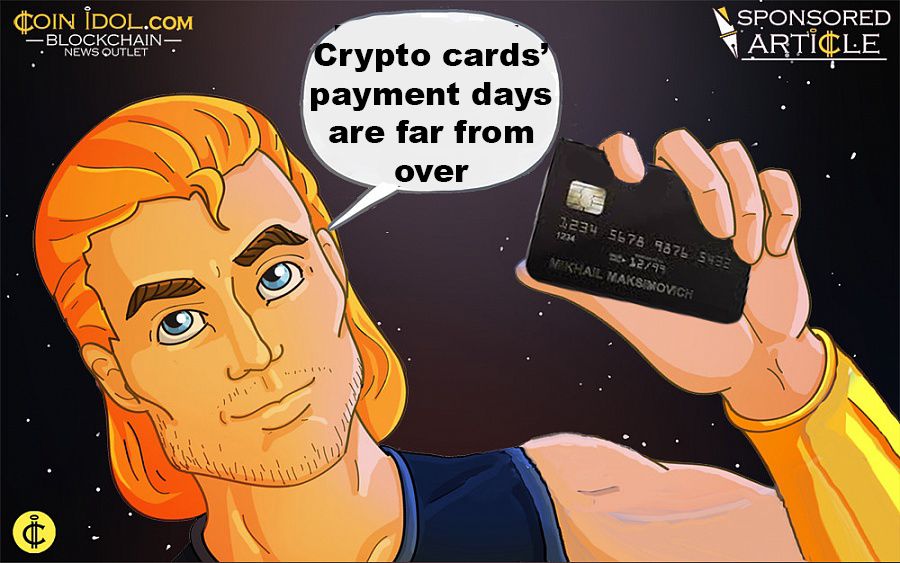After WaveCrest, Crypto Cards’ Payment Days Are Far From Over

Cards and crypto don’t mix very well at the moment. There’s been a lot of trauma in the space but before looking at that and the solutions it requires, why does the crypto industry need credit or debit cards in the first place?
Crypto has adoption barriers that have been widely aired. Chief among them is the volatility of the nascent asset class. Why spend your crypto if it is going to go up in value tomorrow and you’ll get more bang for your buck, so to speak?
However, that’s not the only problem. A more fundamental one in some ways, and one that has been engaged with from the outset, is the challenge of putting in place easy-to-use ways of acquiring and spending crypto.
Those in crypto who have been on the inside looking out for some time will no doubt take the view that today it’s pretty easy to use cryptocurrency as a means of payment, assuming you don’t mind the volatility. But that rose-tinted view likely comes from being around a while and remembering how it used to be before there were crypto debit cards or exchanges such as Coinbase that let you buy crypto (Bitcoin, Ethereum, Litecoin and Bitcoin Cash) with a debit card and, until recently, a credit card.
If you want to spend crypto, however, especially a crypto other than bitcoin, you still have to jump through quite a few hoops. Buying an Amazon gift card via, for example, BitPay or CryptoPay means that the largest retailer in the world is, in a roundabout way, open for crypto business. However, having to buy a gift card before you make your purchase is not ideal. Then there are the likes of Overstock – an online retailer that is “crypto-first”. The downside however is that it is based in the US, so those buying non-digital goods from beyond the continental USA will get hit with shipping costs.
The Crypto Card Solution… Until WaveCrest’s Visa Difficulties
These are just some of the reasons why crypto cards have come along to fill the gap. It means that instead of the merchant having to accept crypto, the crypto card holder just has to convert their crypto into fiat through their crypto card issuer when they buy. Depending on the card issuer, that conversion can happen at the point of sale or at some time before the purchase.
That approach worked fairly well but then it all started to go wrong.
In January the major provider of cards to the crypto card issuing companies, WaveCrest, was blocked by Visa from doing business. With its membership revoked, it was no longer able to service the card issuers and those already issued stopped working. Visa dropping its unannounced bombshell left consumers high and dry and the card issuers too.
Wirex, Bitwala, CryptoPay and others all saw their business models seemingly thrown under a bus as they scrambled to find alternative payment solution providers. Visa was at pains to point out that they were not anti-crypto per se – they had a problem with WaveCrest flaunting its rules of membership and not with crypto as such.
Not all the cards issuers were affected though. Monaco, for example, the fee-less crypto card, is still up and running. The WaveCrest mess showed up the danger of too many industry players being reliant on one company.
A New Way Forward for Crypto Cards
However, there is a provider that anticipated the debacle – TokenCard. The team at the London-based issuer had already become somewhat dissatisfied with WaveCrest because of the shrinking reach of its service was becoming less and less global in it issuance.
Although TokenCard is yet to reveal who its new partner is, it did announce in January that it had a “prominent and large issuer” on board, giving it “the ability to deploy cards globally”.
This is good news for the crypto community, even more so when the TokenCard offering is broken down. A well as being able to seamlessly switch between crypto and a variety of fiat currencies, users will also be able to store Ethereum-complaint tokens on the cards.
And better still, you will be able to use the card to receive tokens from initial coin offerings you may have participated in. TokenCard has created a product not just for spending crypto tokens but for managing them too.
All of this will be available right from within the app, which makes ease-of-use a reality, combined with the security of being able to stop transaction on your card in the event of theft or its security being undermined in some other way. It is also contactless, which in Europe and Asia is a big deal – the card comes with an NFC chip that lets you present it at a terminal when you are paying, without having to key in a PIN.
Crypto cards are not the be-all and end-all of the cryptocurrency mass adoption story but they are certainly a big part of it.
TokenCard is certainly doing its bit to repair the damage done to crypto cards’ image when Visa removed WaveCrest from its network; it’s on a mission to make debit cards and crypto friends again.
Disclaimer. This article is paid and provided by a third-party source and should not be viewed as an endorsement by CoinIdol. Readers should do their own research before investing funds in any company. CoinIdol shall not be responsible or liable, directly or indirectly, for any damage or loss caused or alleged to be caused by or in connection with the use of or reliance on any such content, goods or services mentioned in this article.
News
Price
News
Price
Coin expert

(0 comments)